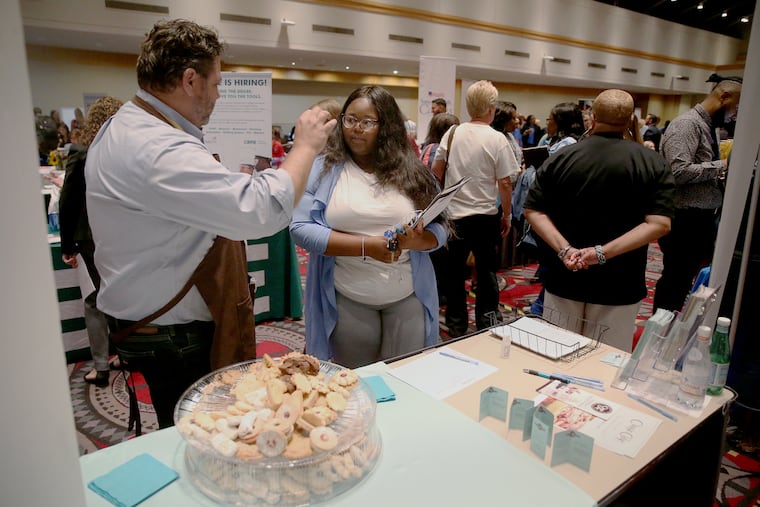Starting Sept. 1, Philly employers can no longer ask job applicants their salary history
The idea behind the ordinance is that pay inequities due to gender and racial discrimination snowball over time if wages at new jobs are based on how much job applicants made at a past one.

In a win for the wage-equity movement in Philadelphia, city officials announced Thursday that as of Sept. 1, they will begin enforcing a ban on employers asking job applicants their salary history.
The idea behind the ordinance, passed by Philadelphia City Council in 2017, is that pay inequities due to gender and racial discrimination snowball over time if wages at new jobs are based on how much new hires made at a past one. Studies suggest women on average make about 80 cents for every dollar a man does, a gap that is even bigger for women of color.
Some corporate leaders initially balked at the Wage Equity Ordinance, and the Greater Philadelphia Chamber of Commerce sued the city over it, claiming it violated the commercial-speech rights of businesses and saying there was little evidence a salary-history ban would put a dent in the wage gap.
Years-long litigation ensued. In February, the U.S. Court of Appeals for the Third Circuit partly reversed a 2018 lower-court decision in the case and said the city could ban employers from asking about salary history and from relying on it to set wages.
» READ MORE: Court rules in favor of Philadelphia’s ban on asking job applicants their salary history
The Chamber didn’t appeal to the U.S. Supreme Court, instead electing to collaborate with the city on how the ordinance would be regulated, effectively ending the court battle.
Then in June, just as the police killing of George Floyd sparked an uprising over racial justice, researchers at Boston University published one of the first major studies examining salary-history bans in about a dozen states. They found that following such bans, pay increased a year later for people who changed jobs by about 5% overall. For women, the increase was 8%, and for Black workers it was 13%.
“Salary histories,” the researchers wrote, “appear to account for much of the persistence of residual wage gaps.”
The Philadelphia Commission on Human Relations approved the final regulations last week, including a clarification that the salary-history ban applies only when an employer is interviewing a job applicant for a position located in Philadelphia — the location of the employer’s headquarters or where the interview is conducted aren’t considered.
The ban also doesn’t apply to applicants for internal transfer or promotion within their current place of work.
There are other ways for companies to set wages. The employer can rely on market data for salaries, ask about competing offers, and may also ask the job applicant about salary expectations, so long as the candidate is not asked whether that expectation is tied to a salary history at other places of work.
» READ MORE: How slow-to-act Philadelphia came to pass some of the most cutting-edge worker laws in the nation
Job applicants who are asked their salary history can report a violation to the Commission on Human Relations, a process that could include filing a formal complaint. The commission could then award the job candidate damages, and the employer could face litigation and fines.
Rue Landau, executive director of the commission, said in a statement that while enforcement can begin soon, it’s the city’s preference that businesses voluntarily comply by revising their procedures in accordance with the law.
Rob Wonderling, president of the Greater Philadelphia Chamber of Commerce, said in a statement that the group is grateful to have had “ample time” to draft and review the regulations ahead of the enforcement date as a result of the pandemic and the “dramatic and negative impact that it has had on the business community.”
“It is our hope that the wage-equity ordinance will help in closing the gender pay equity gap,” Wonderling said, “while at the same time not placing a difficult regulatory burden on the business community.”
Salary-history bans have taken effect in states and municipalities across the country over the last decade, including in New Jersey, where officials last year put in place similar rules.